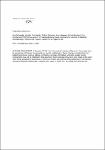First indication for a functional CRISPR/Cas system in Francisella tularensis
Schunder, Eva
Rydzewski, Kerstin
Grunow, Roland
Heuner, Klaus
Francisella tularensis is a zoonotic agent and the subspecies novicida is proposed to be a water-associated bacterium. The intracellular pathogen F. tularensis causes tularemia in humans and is known for its potential to be used as a biological threat. We analyzed the genome sequence of F. tularensis subsp. novicida U112 in silico for the presence of a putative functional CRISPR/Cas (clustered regularly interspaced short palindromic repeats/CRISPR-associated) system. CRISPR/Cas systems are known to encode an RNA-guided adaptive immunity-like system to protect bacteria against invading genetic elements like bacteriophages and plasmids. In this work, we present a first indication that F. tularensis subsp. novicida encodes a functional CRISPR/Cas defence system. Additionally, we identified various spacer DNAs homologous to a putative phage present within the genome of F. tularensis subsp. novicida-like strain 3523. CRISPR/Cas is also present in F. tularensis subsp. tularensis, holarctica, and mediasiatica, but these systems seem to be non-functional.
No license information

